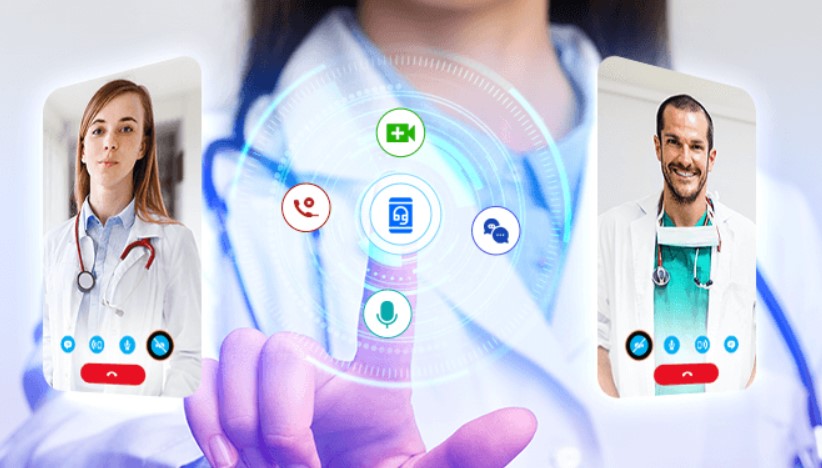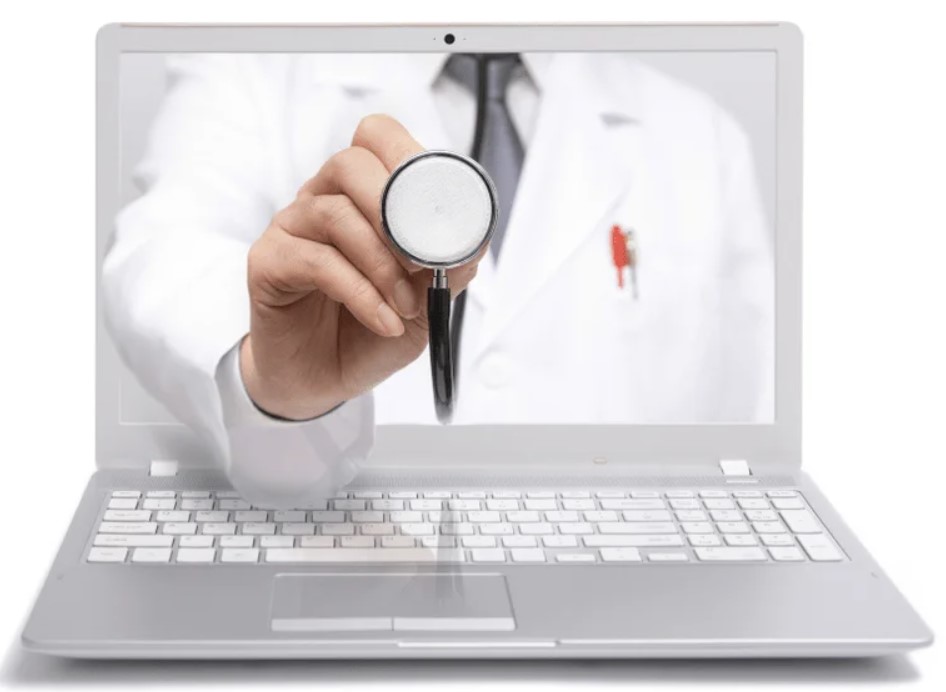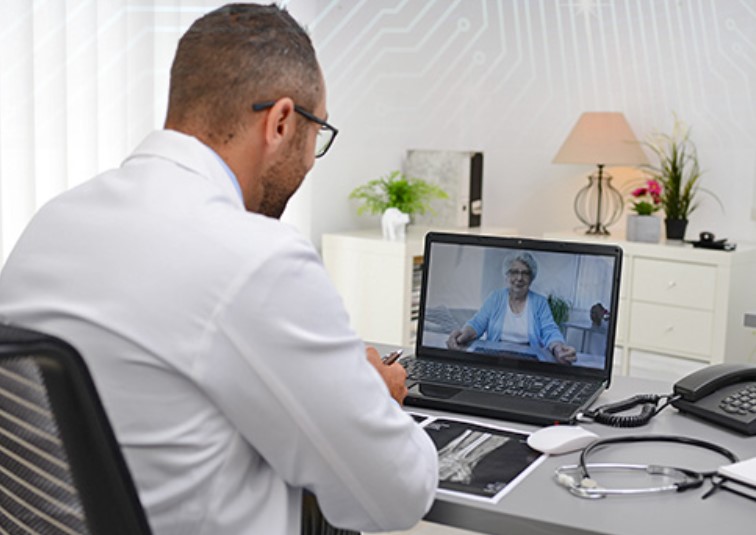Let’s talk about how technology is changing the healthcare landscape. There are 3 main innovative technologies: telemedicine, mobile health technologies, and artificial intelligence, or AI for short.
These new ideas, especially telehealth, are making healthcare easier to use and more accessible. Picture yourself talking to your doctor from home, or using a mobile app to get a prescription for a medicine and have a medical checkup. Artificial intelligence can also assist doctors in analyzing big quantities of data for precise diagnoses and custom treatment schemes. The following article focuses on the possible advantages new technologies can bring to the world to make our healthcare routine more convenient and efficient.
What Is Telehealth?
Do you remember the time when you had to depart from your house just to see a doctor? Today, it’s not necessary. Thanks to telemedicine services, you can communicate with your telehealth doctor via video calls, phone calls, or even text messages from any place in the world. It’s like having a doctor’s appointment right from your couch!
Telemed services have existed for some time, yet it is gaining more attention now. Since 2020, people have been using it more because of the COVID-19 pandemic. They desire to decrease their interaction with others, and so telemedicine provides an excellent solution to this problem. But even without the pandemic, telehealth services have many advantages.

Think about living in a place where there is no specialist nearby. You can have a video call with an online doctor without traveling far distances or spending much money. Telemedicine is useful for providing specialized care to communities that do not have good healthcare accessibility.
To sum it up, if you are a parent with little time, working from far away, or simply want an easier method for seeing a doctor, telemedicine is the solution. It’s straightforward and efficient – you can get medical care when and where it’s needed.
Artificial Intelligence in Disease Diagnosis and Treatment
Picture a planet where doctors have aid from a super-smart assistant in their battle against diseases. This assistant is what we call artificial intelligence (AI) in healthcare. AI help services have the ability to gather the medical records and tests of a patient quicker than any medical institution. That is a new way of diagnosing serious illnesses at the early stages. These services can discover the things that may go unnoticed by human sight, such as initial indications of cancer or heart ailments in X-rays or MRIs.
Yet, AI is not only successful for diagnostics but also for disease prognosis and prevention. It can also help recognize the patients who could be vulnerable to certain diseases by examining their medical records and genetic data. By taking into account elements such as age, gender, and medical past, AI can assist doctors in spotting possible difficulties before they get worse or start to develop.
AI can also be beneficial for individual treatment plans. Each patient is one of a kind, and AI can assist doctors in creating treatments that are unique for every person’s needs. This implies people can take the medications and therapy that suit them most, rather than following a uniform method of treatment.
About Mobile Technologies and Portable mHealth Devices
Picture this – you are jogging and your smartwatch asks to examine your heart rate. You open a health app on your mobile phone and type in your new blood pressure details. Then, search through the online database of a telehealth platform for knowledge on diabetes management.
A portable health niche, also known as mHealth, means using small devices such as smartphones and tablets to get to the details about your health and send them to a specialist before having a virtual doctor visit. This niche is getting bigger annually and offers multiple uses with the corresponding tools.
A fascinating feature of mHealth devices is the capacity to keep an eye on your health in real time. Fitness trackers can tally your steps, gauge your heart rate, and even follow sleep patterns. Health apps are useful for remembering medication, recording symptoms, and communicating with the healthcare telehealth team.
However, mHealth is not only for managing personal health. It can also be a strong instrument to educate people about health issues and prevention. Health knowledge databases can provide guides with such topics as nutrition or telehealth mental health.

For individuals who have ongoing illnesses such as diabetes or heart disorders, mHealth has the potential to be a game changer. With AI medical diagnosis platforms and mHealth devices, you can monitor your blood sugar levels, control your food intake, and interact with others going through similar circumstances. mHealth assists in documenting conditions and recognizing possible concerns before they become significant difficulties.
Improving Healthcare Accessibility with the Best Telehealth Services
People who live in rural or less well-off areas may find difficulties in getting to a doctor’s office. But thanks to a telemedicine appointment, they can talk with healthcare specialists straight from their distant homes, not needing to spend time on long drives and pay for travel costs. Also, the health apps that are found on smartphones give people the ability to enter health information and gather resources no matter where they are situated.
So if you have problems with finding any medical care facilities in your neighborhood and the search requests like “hospitals nearby” do not give any results, then consider searching for “telehealth near me”. You can get a lot of results and talk to a healthcare specialist on the same day without leaving your house.
This technology does not only increase the possibility of reaching healthcare, it also improves it. Devices such as smartwatches and fitness trackers allow patients to track their health data instantly. Doctors can study this data before deciding on the most suitable treatment method, and they may recognize any problems that require attention in advance.
The Considerations Associated With Telehealth and AI Technologies
The main concern is privacy. When sensible medical data is gathered and exchanged online even from the protected AI-based telehealth website, it is crucial to protect the patient’s right for the privacy of medical history records. The best telehealth services secure storage for data, strict controls on who can access it, and clear rules about how data should be used and shared.
Legal regulation can also become a problem. The legislation should make sure there are certain rules and directions for their ethical use. We expect the reasonable approval of legal standards about maintaining data, health consulting, and employing AI within the healthcare sector, along with supervision to guarantee that new technologies are tested and validated.
All these technologies will have value if telehealth providers get the proper training. It won’t work if the person just gets a fancy new gadget and believes that they will automatically understand how it works.
Exploring the Case Studies and Success Stories of Using Telehealth
There are many successful cases of using telemedicine and AI for the benefit of healthcare and patient’s health. Just to name a few of them:
A Telemedicine Program in Rural Arizona
This has been a big change-maker because it helps patients who live far away to connect with specialists through video chat. This way of communication has reduced the number of times people need to go back to local hospitals and also improved how well they recover from illnesses or surgeries. Patients like how easy this is for them, and providers enjoy reaching out to more people in need. According to the National Center for Biotechnology Information Center, this program is quite successful in Arizona.

Mobile Application for a Local Diabetes Community
There is a mobile health app created specifically for the diabetes community. This application helps diabetes patients keep a record of their blood sugar levels, control their diet, schedule their exercise routine, and discuss all these aspects with doctors. As a result, people get better blood sugar control with fewer complications.
A Local Enthusiast Developer Created an AI Tool to Find Breast Cancer at Its Early Stages
Such an AI instrument can assist radiologists in finding the early signs of breast cancer more precisely. The tool analyzes the mammogram picture with innovative machine-learning instruments. The result is you can identify even the lightest symbols usually unnoticed by human sight.
All these amazing cases teach us that telehealth and AI technologies can truly affect the healthcare system, both locally and globally. These possibilities can’t be ignored or neglected because they can truly make the quality of life better.
What Does the Future Bring to Healthcare With the Development of Telemedicine and AI?
Think about the potential of saving all your health data on a blockchain in the future. The blockchain can make it secure and organized. This is what will give you complete control over who gets to view it and how they use the information.
But, it’s not just about the new and amazing devices. The future of healthcare technology also relies on collaboration and teamwork. Patients need to have real-time access to the collective opinion about their health conditions from doctors, nurses, investigators, engineers as well as patient supporters.
Working together is a crucial aspect of addressing health disparities. Technology has the potential to minimize this gap but adequate pricing and conditions should be present as well.
Just imagine the future where CVS telehealth and Blue Cross telehealth services can be accessible from any household around the country. The possibilities are endless.
Conclusion
The future of healthcare is strongly connected to new technologies. Such tools such as telemedicine, mobile health apps, and artificial intelligence can help to improve the system of gathering tests and analyzing medical records. With such a technology’s potential, we can change global healthcare dramatically and build another system that genuinely prioritizes patients despite their health disparities.
Though, we can’t predict the future, one thing is clear: the future for healthcare technology looks very promising and full of potential. With correct telemedicine services, AI help tools, cooperative work, and a proper mindset – we can have a new world where all people have access to effective treatment and live their healthiest lives possible.
